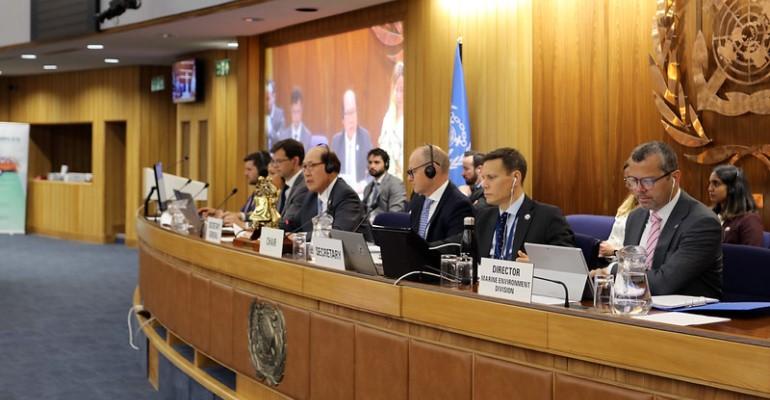The International Maritime Organization (IMO), the global regulatory body for the shipping industry, has two back-to-back meetings which will cement the ambition and regulatory framework for the decarbonisation of the shipping industry.
The first meeting is the 15th session of the Intersessional Working Group on Reduction of GHG Emissions from Ships (ISWG GHG), which runs for five days from June 26-30.
ISWG GHG will continue to develop a revision of the IMO’s initial Strategy on the reduction of GHG emissions from ships, consider and select medium- and long-term GHG reduction measures, and develop guidelines for fuel lifecycle analysis (LCA).
Much of the work at ISWG GHG lays the foundation for the 80th meeting of the Marine Environment Protection Committee (MEPC 80) the following week, July 3-7.
MEPC 80 will be informed by ISWG GHG’s work, and comes at a time of intense political and industry pressure on IMO to increase its ambition on cutting emissions.
Revision of the Initial IMO GHG Strategy
IMO’s initial GHG strategy was adopted in 2018 and was widely criticised for falling short of the ambition to meet the Paris Agreement goal of limiting global warming to 1.5 degrees Celsius above pre-industrial levels.
The initial targets include cutting total emissions from shipping by 50% by 2050 compared to 2008 levels. Calls have grown louder in recent years for the IMO to increase this ambition to net zero carbon emissions by 2050, with a series of checkpoint goals in 2030 and 2040 to ensure the industry is on track.
IMO said it expects a working group to be established after plenary comments at MEPC 80 to finalise the new draft strategy, a document which has been discussed and revised line-by-line over multiple MEPC meetings.
“After several months of negotiations, the MEPC 80 session is expected to adopt an upgraded IMO greenhouse gas Strategy. The IMO GHG Strategy will contain concrete greenhouse gas reduction targets for the sector and is expected to outline a basket of technical and economic measures to be developed to set global shipping on an ambitious path towards phasing out greenhouse gas emissions,” said IMO.
Medium- and long-term measures
The mechanisms by which shipping decarbonises over the medium and long-term will be put forward by ISWG GHG to MEPC 80. Proposed measures came from an assortment of States and organisations and have been analysed and compared by various committees and working groups.
Candidate measures include ICS’s Maritime Sustainability Fund and Reward scheme, Japan’s zero emissions feebate mechanism, Norway’s emissions cap and trade scheme, a GHG fuel Standard from Austria and others, mechanisms from China and Argentina based around sustainability funding, and a GHG levy put forward by the Solomon Islands.
The path forward for the selected measure or measures will be included in the revised draft IMO GHG Strategy, including impact assessments for candidate measures or combinations of measures.
Fuel lifecycle analysis
Agreeing the GHG emissions of any given fuel will be essential to fair future regulation. One area of debate in assessing fuel emissions is whether to count emissions on a tank-to-wake (TtW) basis, only accounting for emissions created by using a fuel, or on a well-to-wake (WtW) basis, accounting for emissions from the extraction/cultivation, production, transport, and use of the fuel.
Well to wake emissions can include complex calculations such as indirect land use change (ILUC) for biofuels, where emissions are considered from converting forest or other land into farmland for growing biofuel crops.
Countries and organisations including the EU support the use of WtW emissions, whereas China, Brazil and Saudi Arabia were among countries to back a draft proposal to remove well to tank emissions from the IMO’s regulations at the last ISWG GHG meeting. Questions have also been raised over the IMO overstepping its mandate should its regulations reach beyond the maritime industry.
“The MEPC is expected to consider the report of the Correspondence Group on Marine Fuel Life Cycle GHG Analysis, including draft Guidelines on life cycle GHG intensity of marine fuels (LCA guidelines) for consideration and adoption. The draft LCA guidelines will allow for a Well-to-Wake calculation, including Well-to-Tank and Tank-to-Wake emission factors, of total GHG emissions related to the production and use of marine fuels,” IMO said.
In his opening address to ISWG GHG 15, IMO Secretary-General Kitack Lim, said: “Do not wait for the last minute at MEPC to make the compromises and find the solutions, a positive outcome from this group is key to a success next week, and for the future work of this Organization.
“2023 is IMO's year of decisive climate action.
“I urge you all to continue with your constructive negotiations, and to be ambitious and bold.”
Copyright © 2024. All rights reserved. Seatrade, a trading name of Informa Markets (UK) Limited.
Add Seatrade Maritime News to your Google News feed.  |

